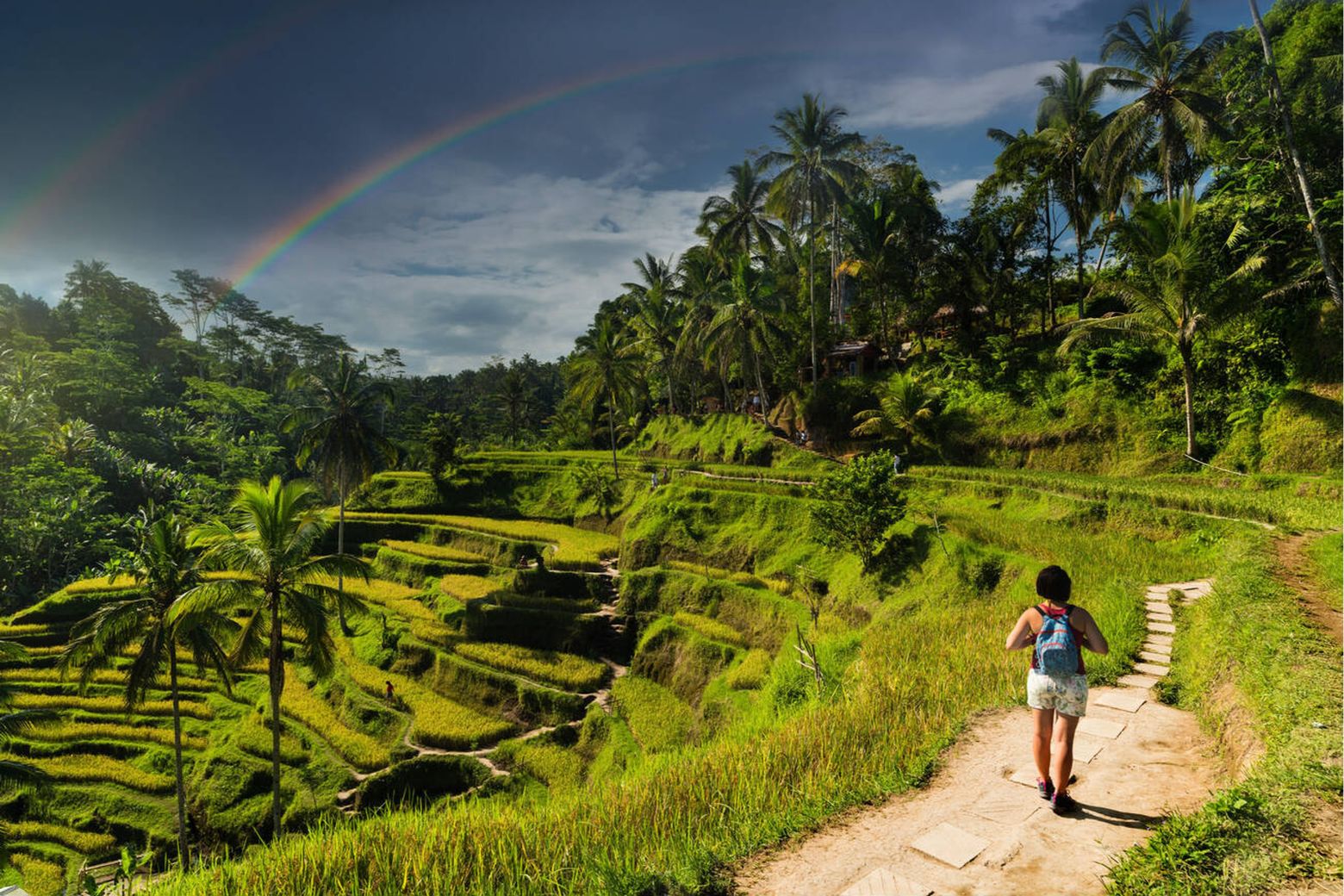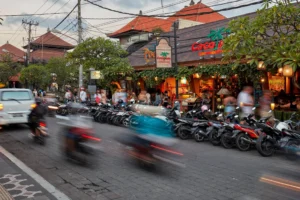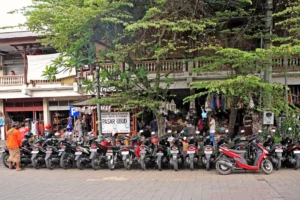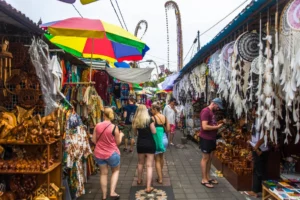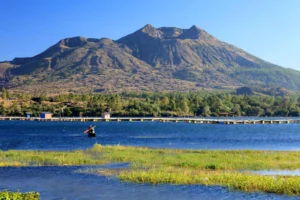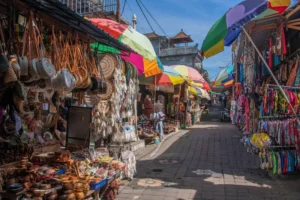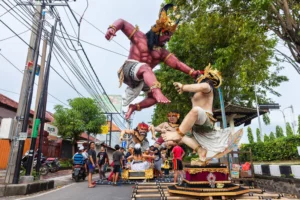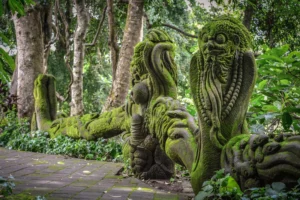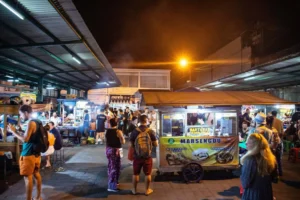Is Bali Safe For Travelers?

Bali is one of the world’s most popular travel destinations. Last year, in 2024, over 6 million visitors came to this tropical haven. I often get asked if Bali is safe or not. So, as someone who visited Bali, I know Bali is safe. Places like Seminyak, Ubud, and Canggu are kid-friendly and secure for female solo travelers, families, solo travelers, and couples. I think safety is about understanding the island’s unique lifestyle.
While Bali is safer than most places, there are risks you need to know. From volcanic eruptions to rabies and scams like the ‘hiking mafia are present. So, being prepared is key. Cheeky monkeys, beautiful beach, breathtaking views, chaotic motorbike traffic, and sacred customs make Bali a unique place to visit.
In this guide, I’ll share my personal experiences and tips so you can explore Bali without worrying.
Check out 50 Bali Pictures That Will Make You Want to Travel to Indonesia.
For the latest official safety updates, check –
- Check the U.S. State Department’s Bali Travel Advisory.
- Monitor Bali Provincial Government Alerts.
Crime & Safety: What I’ve Seen (and Survived)
Violent Crime & Theft
Violent crime in Bali is rare. According to the UN, Indonesia’s murder rate is 0.3 per 100,000 people—20 times lower than the U.S. But petty theft? That’s a different story. In tourist hotspots like Canggu and Kuta, drive-by phone snatchings are common. My friend lost her iPhone this way. So, precaution is better.
Here’s how to stay safe:
- Use anti-theft bags or crossbody straps.
- Avoid unstaffed villas—hotels have better security.
- Report thefts to the Bali Tourist Police (+62 361 759 999).
For more crime stats:
Common Scams
Bali isn’t the scammiest place, but there are a few tricks to watch for. Like, fake money changers are everywhere in tourist areas. I once saw a traveler lose $100 to sleight of hand. Stick to ATMs or reputable exchanges like Central Kuta Money Exchange.
Another scam is the ‘hiking mafia.’ I faced them at Mount Batur. A group of ‘Guides’ blocked my path until I threatened to call the police. You don’t need a guide for most hikes—go early and follow the trail.
Finally, watch your drinks in clubs. Spiking is rare, but it happens. Stick to sealed bottles. Learn more from my blog, Best Things To Do In Bali – Know Before You Go.
Transportation Risks
Motorbikes are Bali’s most dangerous hazard. In 2025, 32% of tourist injuries involved motorbikes (Bali Health Office). I’ve ridden scooters here, but I wouldn’t recommend it unless you’re experienced. The Traffic in the city is extreme.
Here’s my advice:
- Use ride-hailing apps like Grab or GoJek.
- Ensure your travel insurance covers motorbikes (e.g., SafetyWing).
- Hire a private driver via Klook for longer trips.
For more transport tips, visit Pilot Plans’ Bali Transport Guide.
Local Laws & Drug Penalties
Indonesia has specific laws that travelers should be aware of. A new criminal code is being implemented in 2025, including regulations on extramarital cohabitation. The enforcement of certain provisions may require a direct complaint from a family member. Visitors must respect local customs and traditions. You should consult your country’s travel advisories for updates on Indonesian laws and cultural norms.
Indonesia’s drug laws are extremely strict. Getting caught with any illegal drug, even a tiny amount, can mean serious trouble. You could face years in prison, heavy fines, or even the death penalty. The safest course of action is to avoid all illegal drugs while in Indonesia.
Key resources:
- Indonesia’s Narcotics Law (strict drug penalties).
- Indonesian Immigration Law (visa rules).
Wildlife Hazards: Monkeys, Snakes, Spiders & More
Snakes: Are They a Real Threat?
Yes, Bali does have snakes like pit vipers, cobras, and the occasional python. But during my travels here, I didn’t see any. You’re more likely to encounter snakes if you’re hiking in jungle areas or staying near rice fields.
Here’s how to stay safe:
- Watch your step. Wear closed-toe shoes on hikes or evening strolls.
- Give them space. If you see a snake, don’t try to shoo it away; just back up slowly.
- Seek help immediately if bitten. Head to a hospital ASAP for antivenom—don’t wait around.
If bitten, head to Sanglah Hospital or BIMC Kuta. For snake identification, visit Bali Reptile Rescue.
There are snakes and other animals, but don’t stress. Just keep these tips in mind and carry on with your Balinese adventure. For more information on Bali’s reptile life and what to do if you spot a snake, check Bali Reptile Rescue’s official site.
Spiders: Should You Worry?
Bali is home to some sizable spiders like huntsmen, tarantulas, and orb-weavers. The good news is that none are deadly to humans. I’ve stumbled on a few big ones lurking in my garden or near the rice fields. Trust me, they’re more scared of you than you are of them!
Here are my quick tips:
- Shake Out Your Shoes – Especially if you leave them outside overnight. Spiders love a cosy hiding spot.
- Don’t Disturb Webs – Orb-weavers build large webs in gardens, but they’re harmless if you leave them alone.
- Stay Calm If You Spot One Indoors – Usually, they’ll scurry away on their own. If needed, gently nudge them out with a broom—no smashing required.
If you get bitten and notice swelling or irritation, pop by a local clinic or hospital just to be safe. For more on Bali’s eight-legged residents and tips on dealing with them humanely, check out the Bali Reptile Rescue’s Info on Invertebrates.
Motorbike Laws & Insurance: The Essentials
Let me tell you a not-so-fun side of riding a scooter in Bali. Foreign tourists must have an International Driving Permit (IDP) and a valid home-country license when endorsed for motorcycles. Without it, you’re driving illegally—and Bali police do target tourists at checkpoints. I’ve seen people get fined 500,000 IDR ($35) on the spot. In the worst case, tourist can have their bikes impounded.
But the bigger risk? Insurance. Most travel insurance policies (even popular ones like World Nomads) exclude coverage if you’re in an accident without a valid IDP or weren’t wearing a helmet. Sometimes, people fracture their arms in accidents. In this kind of scenario, the insurance company wouldn’t cover the medical bills. So, be aware.
Here’s how to stay legal and safe:
- Get an IDP before arriving (AAA for U.S. citizens, AA UK for Brits).
- Rent from reputable shops that check licenses (Skyscanner).
- Verify insurance coverage—companies like SafetyWing cover motorbike accidents only if you have an IDP.
- Never skip the helmet—Bali’s roads are chaotic, and head injuries are common.
Doing it right might save you thousands—or your life.
Natural Disasters: Bali’s Wild Side
Earthquakes & Tsunamis
Bali sits on the Pacific Ring of Fire, so earthquakes are a reality. A 5.6 quake happened last year. While scary, most quakes are minor. But if you’re near the coast and earthquakes happen, a tsunami could follow.
Here’s how to stay prepared:
- Download the BMKG app for real-time earthquake alerts.
- Know your hotel’s evacuation route.
- If you feel a strong quake, move to higher ground immediately.
For real-time updates, visitBMKG’s Official Website. Bookmark GDACS for global disaster alerts.
Volcanic Activity
Bali has two active volcanoes: Mount Agung and Mount Batur. Agung last erupted in 2017, spewing ash 4 kilometres high. But don’t let that scare you—eruptions are rare, and volcanoes are far from tourist areas.
Here’s what to know:
- If you hike, go with a licensed guide and start early to avoid midday heat.
- Respect local warnings—they’re there for your safety.
Monsoon Season Risks
Bali’s monsoon season (October to April) brings heavy rains, floods, and landslides. People often got stuck in this situation because roads were blocked and impassable for hours.
Here’s how to stay safe during monsoons:
- Avoid remote areas like Munduk during heavy rains.
- Book flexible flights—delays are common.
- Carry a rain jacket and waterproof bag for your gadgets.
Check Bali Weather Updates before travelling.
Common Health Concerns
Bali is paradise, but that doesn’t mean it’s germ-free. The biggest culprit is often ‘Bali Belly’—a traveller’s diarrhoea that strikes when you least expect it. I’ve had my fair share of close calls on long scooter rides.
I learned this the hard way when I arrived here—tap water in Bali is not drinkable. Locals boil water or use refill stations, and I recommend you do the same. Tons of cafes now offer filtered water refills—super handy if you carry a reusable water bottle (and more eco-friendly!). Avoid brushing your teeth with tap water. Especially if you have a sensitive stomach. Be cautious because the less time you spend in the bathroom, the more time you have exploring this gorgeous island!
Here’s how to avoid it:
- Drink bottled or filtered water—tap water in Bali isn’t safe to drink (more on that below).
- Wash or peel fruits and veggies—especially if you grab them from local markets.
- Pack rehydration salts are a lifesaver if you catch the dreaded tummy bug.
Another concern is dengue fever, especially during the wet season. Dengue mosquitoes breed in standing water, so taking precautions is essential. Protect yourself from dengue fever by using insect repellent (with DEET or picaridin) and sleeping in rooms with screens or mosquito nets.
General tips:
- CDC Indonesia Health Advice.
- Avoid ‘arak’ (local alcohol); stick to sealed bottles.
Water Safety & Surf Conditions
Bali’s beaches are postcard-perfect, but the waves can be wild. Strong riptides are no joke—even confident swimmers can get caught off-guard. If you see red flags on the beach, it means, ‘Don’t swim here, seriously.’ Respect their warning. Look for beaches with lifeguards (usually marked by red and yellow flags).
If you’re here to surf and a pro ai surfing, that’s good. But if you’re a newbie, book a lesson at a reputable surf school. They’ll teach you the basics, from pop-up techniques to spotting dangerous currents. I’ve wiped out plenty of times, but thanks to a good instructor, I managed to avoid serious injuries.
Cultural Etiquette: Respecting Bali’s Traditions
Dress Codes & Temple Visits
Balinese temples are sacred, and dressing modestly is a must. In 2025, stricter dress codes will be enforced at sites like Besakih Temple. I once saw a tourist turned away for wearing shorts—don’t make the same mistake!
Here’s how to dress for temples:
- Wear a sarong and sash (available for rent or purchase at temple entrances).
- Cover your shoulders and knees.
- Remove shoes before entering the inner sanctum.
For more information on temple etiquette, check Bali’s official tourism site.
Nyepi Day: Bali’s Day of Silence
Nyepi is Bali’s most unique cultural event. On March 29-30, 2025, the island shuts down—no lights or internet. Even the airport closes! This one-of-a-kind Culture will keep you captivated.
Here’s how to prepare:
- Stock up on food and water the day before.
- Download movies or books—you’ll be offline for 24 hours.
- Respect the silence—no loud noises or outdoor activities.
- More – Nyepi Day Guide.
Environmental Responsibility
Bali’s beauty is under threat from overtourism. The island is cracking down on plastic waste and water scarcity. I’ve seen beaches littered with trash, and it breaks my heart. So, I joined a beach clean-up group to help clean the beach. This kind of simple work could save this topical paradise.
Here’s how to travel responsibly:
- Avoid single-use plastics—bring a reusable water bottle.
- Support eco-friendly businesses like Alkaline Café for water refills.
- Respect nature—don’t litter or damage coral reefs.”
Learn my tips to Affordable Eco-Friendly Tips for Traveling – Sustainable Vacation
For eco-tips, visit Eco-Bali’s Sustainability Guide. Also, you can Join beach cleanups with Trash Hero Bali.
Special Traveler Considerations: Bali for Everyone
Solo & Female Travelers
Bali is one of the safest destinations for solo and female travellers. I’ve explored the island alone many times, and the locals are incredibly welcoming. But like anywhere, it’s important to stay alert. Personal safety can be maintained just by avoiding risky steps.
Here’s how to stay safe:
- Stick to well-lit areas at night, especially in Kuta and Seminyak.
- Use ride-hailing apps like Grab or GoJek for transportation.
- Avoid walking alone on quiet beaches after dark.”
For solo travel tips, check How to Plan a Solo Trip for the First Time.
LGBTQ+ Travelers
Bali is LGBTQ+-friendly, but Indonesia is a conservative country. While same-sex relationships are legal, public displays of affection (PDA) are not welcomed. Some LGBTQ+ people said they felt safe here, but they avoid PDAs to respect local customs. I believe you should always respect local customs no matter where you travel.
Here’s how to navigate Bali as an LGBTQ+ traveller:
- Stay in LGBTQ+-friendly areas like Seminyak and Canggu.
- Be discreet in public—save affection for private spaces.
- Research LGBTQ+-owned businesses for a welcoming experience.
Families with Kids
Bali is a fantastic destination for families. I saw people come here with families and enjoy a lot. Kids love Bali Safari Park and Waterbom Bali. But there are a few things to remember for a smooth trip.
Here’s how to travel with kids:
- Choose family-friendly areas like Sanur and Nusa Dua.
- Pack sunscreen and insect repellent—kids are more sensitive to bites.
- Visit child-friendly attractions like the Bali Bird Park and Green School.”
For family travel tips, check out this Essential Travel Guide.
Emergency Resources: Staying Prepared in Bali
Hospitals
Bali has several high-quality hospitals, but they can be expensive without travel insurance. I visited BIMC Hospital in Kuta for my stomach upset, and their service was excellent.
Here are the top hospitals for tourists:
- BIMC Hospital Kuta: +62 361 761 263 (English-speaking staff).
- Siloam Hospitals Denpasar: +62 361 779 900 (modern facilities).
- Sanglah General Hospital: +62 361 227 911 (affordable but busy).*
- BIMC Hospital (Kuta).
- Siloam Hospitals (Denpasar).
Police & Tourist Hotline
Bali’s police are generally helpful to tourists. The tourist hotline (+62 361 759 999) is available 24/7 for emergencies or reporting scams. Save the tourist hotline number in your phone. Report theft or scams immediately—don’t wait. Always try to avoid confrontations—let the police handle disputes.
Embassies
Your country’s embassy can assist if you lose your passport or need legal help. Last time, I lost my wallet and needed emergency funds—the U.S. Embassy in Denpasar was a lifesaver.
Here are key embassy contacts:
- U.S. Embassy Denpasar: +62 361 233 605.
- Australian Consulate Bali: +62 361 241 118.
- British Honorary Consul Bali: +62 361 270 601.
- Full list: Embassy Pages for Bali.
FAQs: Your Bali Safety Questions Answered
1. Is Bali safe at night?
“Yes, Bali is generally safe at night, especially in tourist areas like Seminyak and Ubud. However, avoid walking alone on quiet beaches or dark streets. Stick to well-lit areas and use ride-hailing apps like Grab or GoJek for transportation.”
2. Are there dangerous spiders in Bali?
“Bali has spiders, but none are deadly to humans. I’ve seen a few large ones in rural areas, but they’re shy and avoid people. Just shake out your shoes before wearing them, and you’ll be fine!”
3. Can I hike volcanoes alone?
“While it’s possible to hike volcanoes like Mount Batur alone, I don’t recommend it. The ‘hiking mafia’ can be aggressive, and trails can be confusing. Hire a licensed guide for safety and support.”
4. What’s the penalty for breaking local laws?
“Breaking local laws, like disrespecting temples or using drugs, can lead to fines, deportation, or even jail time. Always respect Balinese customs and avoid illegal activities.”
For more information on local laws, visit Bali’s official tourism site.
5. Is Bali safe for tourists?
Bali is generally safe for tourists, with millions visiting annually. However, exercise standard precautions against petty crime, traffic hazards, and natural disaster risks (e.g., volcanic activity). Stay informed about local advisories and cultural norms.
6. What are the common safety concerns in Bali?
- Petty crime: Pickpocketing, bag snatching (especially in crowded areas like Kuta or Ubud markets).
- Traffic accidents: Chaotic roads, inexperienced drivers, and narrow streets.
- Scams: Unlicensed taxis, inflated prices, and money exchange fraud.
- Natural disasters: Volcanic eruptions (Mount Agung/Batur), earthquakes, and seasonal flooding.
- Health risks: “Bali belly,” dengue fever, and rabies from stray animals.
7. Is it safe to walk around Bali at night?
In well-lit, tourist-heavy areas (Seminyak, Canggu), walking at night is generally safe. Avoid isolated spots, secure belongings, and use trusted transport. Solo travelers should remain vigilant.
4. How safe is it to drive in Bali?
Driving can be hazardous due to congested roads, erratic scooter traffic, and left-side driving. Rent scooters only with an international driving permit and helmet. Police frequently check licenses. Consider hiring a local driver for safety.
8. Are there risks of natural disasters in Bali?
Yes. Bali lies on the Pacific Ring of Fire, risking earthquakes, volcanic eruptions, and tsunamis. Monitor alerts from local authorities and the PVMBG (volcano monitoring agency). Flooding occurs during the rainy season (Oct–Apr).
9. Is Bali safe for solo travelers?
Yes, but take precautions:
- Avoid isolated areas after dark.
- Secure valuables in hostel/hotel safes.
- Use reputable transport (e.g., Blue Bird Taxi).
- Stay in social accommodations (hostels, coworking spaces) to meet fellow travelers.
10. What precautions should I take while visiting Bali?
- Use anti-theft bags and avoid flashing valuables.
- Drink bottled water; skip ice in questionable establishments.
- Verify taxi meters or use ride-hailing apps (Grab/Gojek).
- Ensure travel insurance covers medical emergencies and natural disasters.
- Respect local customs (e.g., temple dress codes).
11. How prevalent is petty crime in Bali?
Petty theft (pickpocketing, phone snatching) is common in crowded areas. Secure belongings, especially on beaches or scooters. Avoid leaving items unattended, as monkeys in Ubud’s Sacred Monkey Forest may steal them.
12. What should I do in case of an emergency in Bali?
- Dial 112 (general emergency), 110 (police), or 118 (ambulance).
- Contact your embassy for lost passports or legal issues.
- Visit reputable clinics (e.g., BIMC Hospital) for medical needs.
- Ensure travel insurance includes medical evacuation coverage.
13. Are there any health risks I should be aware of while in Bali?
- Dengue fever: Use mosquito repellent.
- Bali belly: Avoid tap water and street food with questionable hygiene.
- Rabies: Vaccinate pre-travel; avoid stray animals.
- Sunburn/heatstroke: Use sunscreen and stay hydrated.
- COVID-19: Check entry requirements and vaccination rules.
Bali is Safe—If You’re Prepared
Bali is one of the safest destinations I’ve travelled to, but like anywhere, it has quirks. From cheeky monkeys to motorbike chaos, being informed is your best defence. Whether you’re a solo traveller, a family, or an adventure seeker, Bali has something for everyone—as long as you respect its culture and stay aware of your surroundings.
Ready to explore Bali? Download my free Bali Safety Checklist to stay prepared. And if you have more questions, drop them in the comments—I’d love to help!
This guide is based on my experience and current info as of 2025. Things can change fast—volcanic activity, new regulations, pandemic rules, you name it. Always double-check official government sites, embassy advisories, or reputable travel sources for real-time updates. I aim to give you a heads-up, but ultimately, it’s your call to stay informed and safe.
For more travel tips, check The Broke Backpacker’s Bali Guide.

